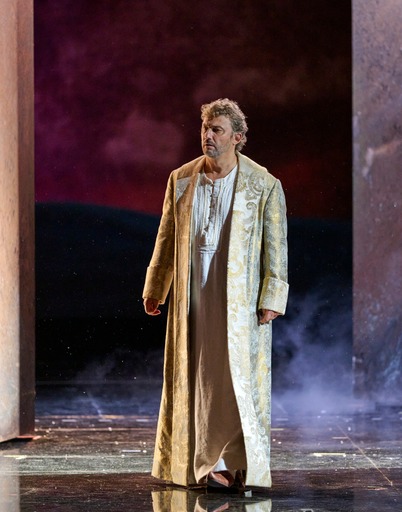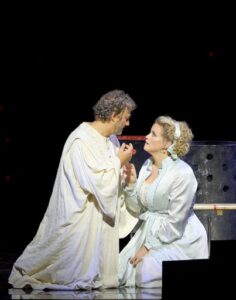Although arguably Otello’s skin colour makes him an outsider, a proven soldier in service of Venice, he has risen socially as a Moor. Even further, after secretly marrying a senator’s daughter.’ The proud warrior’ may suffer from a sense of inferiority, but more from intense jealousy. The lost handkerchief, crucial in the intrigue, is a symbol of Desdemona’s purity, innocence and chastity: why Otello’s enraged she’s given it to Cassio. Otello regards Desdemona as his property; in this patriarchy, his love is one of his possessions. And chastity is intrinsic to her value as a social commodity. Verdi describes Desdemona (‘marmorial’ soprano Rachel Willis-Sorensen), as a symbol of goodness, resignatio, sacrifice!‘
Verdi and librettist Boito’s drama, focusing on Otello, Desdemona, and Jago, might seem a love triangle; although Jago (Ludovic Tezier) and Desdemona don’t meet, and Cassio’s the alleged adulterer. Verdi’s opera is a closely observed psychological study of envy, sexual jealousy. ‘Race’ is only a part of it.
Meanwhile, awaiting that black Messiah, we make do with star tenor Jonas Kaufmann. As if commanding the elements, singing over the storm (tremendous orchestral playing from Vienna State Opera under Alexander Soddy). Kaufmann’s greying-haired Otello has the Commander’s mature dignity and authority. A ‘man of authority’, but in Shakespeare’s tragedy, faithfully adapted by Verdi, brought down by human weakness and jealousy.
In the welcome home party for Otello- in a tavern, men drunkenly carousing on Dick Bird’s impressive sets- ‘the fire of rejoicing is fading fast’. And ominously, Chorus sing, how quickly is the flame of love extinguished.
Jago, busy plotting, using the party atmosphere to get even with Cassio, promises Roderigo (Ted Black) that he’ll one day have Desdemona, ‘the jewel of the islands’. And incites him against Cassio (Bekhzod Davronov) who – plied with drink- instigates a fight. Tézier poses as one of the lads, rabble-rouses, tankard in hand. The uproar is intended to disturb Otello on his wedding night. Otello descends furious. ‘Siezed by the rage of the Turks’, summons ‘honest Jago’ to explain; and demotes Cassio. (It’s Desdemona’s naive attempt to seek justice for Cassio that poisons Otello and their marriage.)
Kaufmann at first seemed ‘blacked up’, (ridiculous, and insensitive); but close-up, he’s well sun-tanned. Does it matter? For Antonenko’s Otello (2019), nordic blonde, fine tenor, no problem.
But unexpectedly the star singer was Tézier’s Jago. In Jago’s soliloquy aria, he sings, like Otello he’s driven by a demon. Jago, of a baser god, was born wretched. ‘I am a villain because I am a man.’ But he’ll turn turn evil to his advantage. Tezier is superlative, singing, man is the plaything of an evil fate. Tézier’s sonorous baritone, rather thuggish physically- the soldier risen through the ranks- defies his blunt origins.
In the scenes with Otello, Jago- serpent-like in Otello/Desdemona’s Eden- implicates Cassio. Did Cassio know Desdemona before you married? Did you confide in Cassio? Do you think he is honest? (Otello, the soldier innocent of intrigues, doesn’t like this at all.) Jago’s Beware my lord of jealousy, is richly ironic.
Kaufmann avails of the experience and subterfuges of technique, his tenor a finely honed instrument. Why so irritable? Desdemona, Willis-Sorenson, now in a claret skirt, white blouse, beckons, come let me soothe your troubles. Unaware, oblivious to the devilish conspiracy (to taint her with adultery.) Jago ‘has a suspicion’; sings of the dream that Cassio purportedly related to Jago (sharing baracks) of passionately kissing Desdemona. Suspicions compounded by the lost handkerchief ‘found’ in Cassio’s quarters.
Kaufmann’s listening, head slumped in pain, convulsed. But Tézier’s Jago, in khaki gear, the plain honest soldier, appears credible.
Otello swears, ‘a thousand lives will not suffice for revenge’;the serpent has siezed her.’ Kaufmann, on his knees, his trembling hand will unleash thunderbolts! In a pledge of loyalty, (high on irony), Tezier and Kaufmann, appeal to the god of vengeance.
Opening Act 3, Kaufmann’s Otello, white shirt and pants tucked into his army boots. The scene of Desdemona’s interrogation. Kaufmann, all subtlety, beckons give me your hand of ivory. The handkerchief, embroidered by a sorceress, woe betide you if you lose it. Sorensen’s Desdemona, visibly frightened, will look for it. She remonstrates- Sorensen outstanding in this harrowing scene. ‘You play a game with me to distract me from Cassio (whose case she unwittingly promotes.) Who is she?- Hounded, chaste am I. She sings of Otello, ‘ a Fury speaks from within you.‘. I hear it but understand it not. Sorensen’s tall blonde, we can believe. Until now, Otello’s passive foil, she sings of ‘the first tears that grief has ever wrung from me!’ God can see she’s faithful.
Kaufmann is kneeling side-of-stage, So you weep too? But he alludes to her ‘most heinous crime’. Is she not a common whore? Give me, once again, your pretty hand. Common whore, he mistook her…But where’s the malice, is Kaufmann a little too cool? Finally, in a public reception for the Venetian envoy, Otello loses it. Complaining that the Doge has recalled him, and promoted Cassio. He violently pushes Desdemona, head down to the ground. Now weep!– Now my heart fears death, she sings plaintively. Kaufmann, as if possessed, has lost sanity, passes out.
Kaufmann (54), no longer the viscerally thrilling young tenor, compensates with experience. In his Act 3 aria, Oh God if you hurled every torment at me! his golden triumphs made lies and deceit, he would have born the cross of grief with humility. Kaufmann enacts the angst, if under projected vocally. But Verdi’s Otello- no mere virtuoso role- was written for a 40-year-old tenor.
 Act 4, Sorensen’s tall, comely blonde, sitting on the side of the richly tapestried, russet-coloured, bed. (But isn’t it really too small for these actors, especially tall beauty Sorensen? And the bed is a dramatic centrepiece of the opera. Desdemona’s ‘Willow Song’ is always moving, but here Sorensen’s somewhat lacking in pathos. But ‘I was born to love and die’, and ‘Fare Thee Well, Emilia’ (Monica Bohinec) is surging with emotion.
Act 4, Sorensen’s tall, comely blonde, sitting on the side of the richly tapestried, russet-coloured, bed. (But isn’t it really too small for these actors, especially tall beauty Sorensen? And the bed is a dramatic centrepiece of the opera. Desdemona’s ‘Willow Song’ is always moving, but here Sorensen’s somewhat lacking in pathos. But ‘I was born to love and die’, and ‘Fare Thee Well, Emilia’ (Monica Bohinec) is surging with emotion.
In an effectively staged ‘Hail Mary’, Sorensen in the midst of candles, sings ‘Pray for those who bear the burden even in the hour of death.’ No applause, but dark orchestral tones, double-basses, urgent violas. – ‘Who is it?’- ‘It is I’, Kaufmann feebly, tentatively joining her on the bed. The famous strangling scene is very realistically played, and shocking. Muio innocente, she pleads. Otello bids farewell to his dead wife with a kiss. Then, stabbing himself, No one flees from me now! Otello fu! But it’s too early to call time on Kaufmann’s consummate artistry. PR © 1.11.2023
Photos all © Jonas Kaufmann (Otello), Ludovic Tézier (Jago); Rachel Willis-Sorensen (Desdemona), Jonas Kaufmann (Otello) © Michael Pöhn/ Wiener Staatsoper


